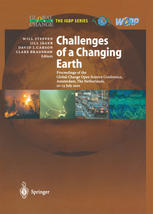

Most ebook files are in PDF format, so you can easily read them using various software such as Foxit Reader or directly on the Google Chrome browser.
Some ebook files are released by publishers in other formats such as .awz, .mobi, .epub, .fb2, etc. You may need to install specific software to read these formats on mobile/PC, such as Calibre.
Please read the tutorial at this link: https://ebookbell.com/faq
We offer FREE conversion to the popular formats you request; however, this may take some time. Therefore, right after payment, please email us, and we will try to provide the service as quickly as possible.
For some exceptional file formats or broken links (if any), please refrain from opening any disputes. Instead, email us first, and we will try to assist within a maximum of 6 hours.
EbookBell Team

5.0
50 reviewsThis volume is based on plenary presentations from Challenges of a Changing Earth, a Global Change Open Science Conference held in Amsterdam, The Neth- lands, in July 2001. The meeting brought together about 1400 scientists from 105 co- tries around the world to describe, discuss and debate the latest scientific - derstanding of natural and human-driven changes to our planet. It examined the effects of these changes on our societies and our lives, and explored what the future might hold. The presentations drew upon global change science from an exceptionally wide range of disciplines and approaches. Issues of societal importance – the food system, air quality, the carbon cycle, and water resources – were highlighted from both policy and science perspectives. Many of the talks presented the exciting scientific advances of the past decade of international research on global change. Several challenged the scientific community in the future. What are the visionary and creative new approaches needed for studying a complex planetary system in which human activities are in- mately interwoven with natural processes? This volume aims to capture the timeliness and excitement of the science p- sented in Amsterdam. The plenary speakers were given a daunting task: to reproduce their presentations in a way that delivers their scientific messages accurately and in sufficient detail but at the same time reaches a very broad audience well beyond their own disciplines. Furthermore, they were required to do this in just a few pages.